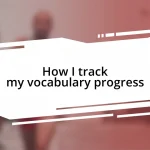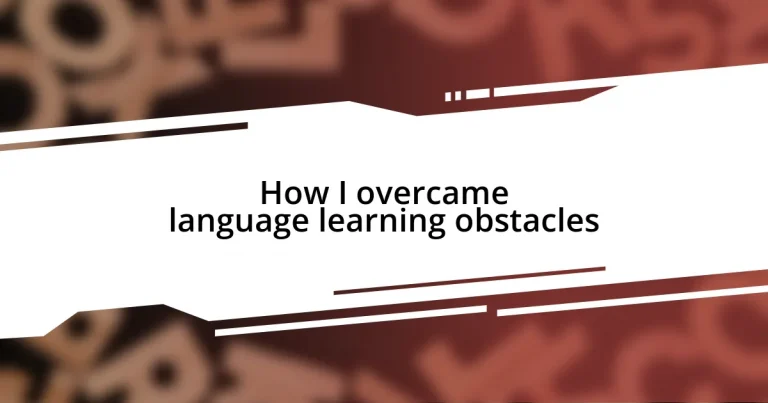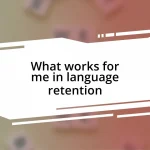Key takeaways:
- Recognizing personal language barriers, such as listening comprehension and speaking confidence, is crucial for progress in language learning.
- Developing effective study habits, including setting clear goals and utilizing varied resources, greatly enhances language retention and engagement.
- Practicing with native speakers and embracing mistakes fosters real communication and boosts confidence in language use.
- Setting realistic, manageable language goals and celebrating small achievements keeps motivation high and supports steady progress in language acquisition.
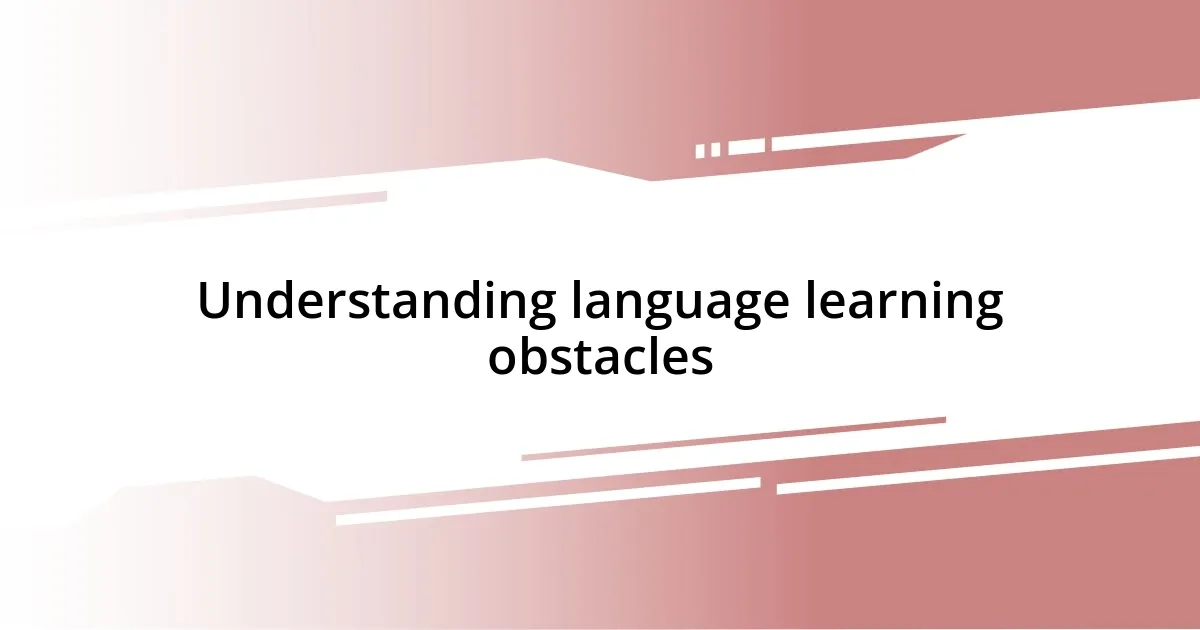
Understanding language learning obstacles
Language learning obstacles can feel mountainous, can’t they? I remember my own struggle with pronunciation. Those early days, standing in front of a mirror trying to mimic sounds felt embarrassing at times, especially when I realized my efforts often resulted in laughter rather than communication. It’s moments like these that make you question—will I ever get it right?
Then there’s the issue of vocabulary retention. It’s frustrating to learn a list of new words only to forget them days later. I vividly recall sitting in a café, surrounded by native speakers, and feeling utterly lost despite having studied diligently. The sinking feeling during those moments made me wonder if my efforts were in vain. How could I bridge the gap between knowledge and real-world application?
And let’s not overlook the fear of making mistakes. I still recall my first conversation with a native speaker; every word felt like a challenge. My heart raced, and I often hesitated, thinking, “What if I sound foolish?” It’s so important to embrace those mistakes. Each stumble is a stepping stone toward mastering a new language, but that realization didn’t come easily to me. Understanding that these fears are universal can provide comfort in our language-learning journeys.
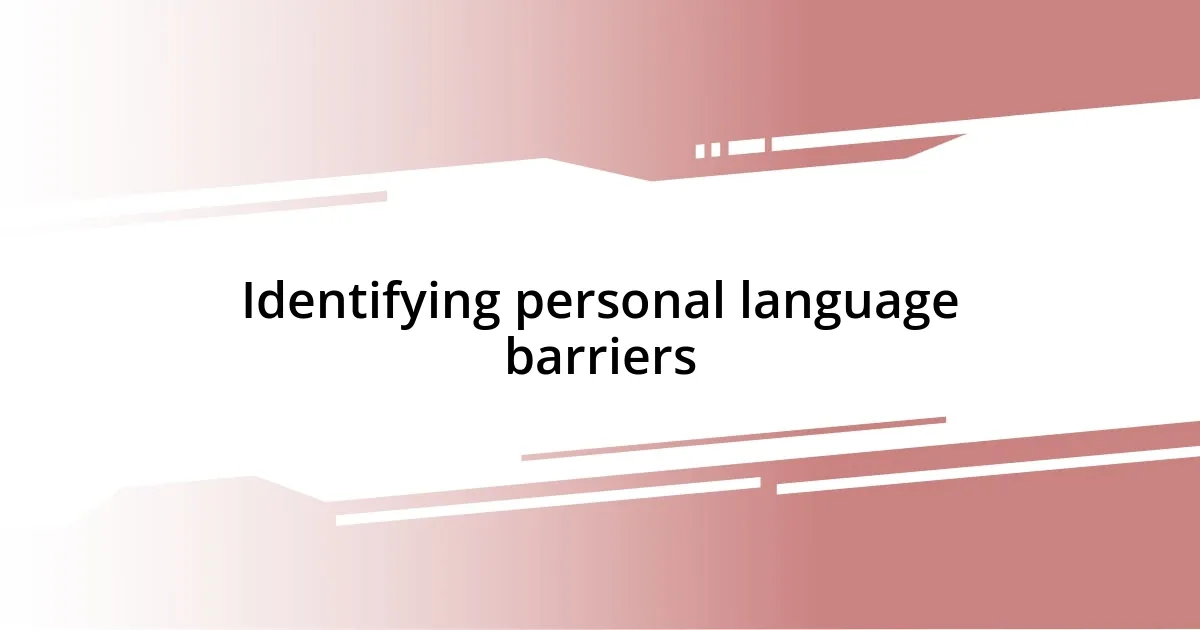
Identifying personal language barriers
It’s crucial to pinpoint the language barriers that hold us back. For instance, I struggled with listening comprehension. I remember attending a language class where the instructor spoke so rapidly that it sounded like a string of nonsensical sounds. I could analyze grammar all day, but when it came to deciphering native conversations, I felt completely lost. Recognizing that listening skills can hinder progress made me realize the importance of incorporating audio resources into my practice.
Another significant barrier is the lack of speaking confidence. In my earlier attempts, I avoided speaking up, fearing judgment from classmates. I recall a moment in a group setting where I wanted to contribute but ultimately sat in silence. It became apparent to me that avoiding participation only deepened my insecurities. Acknowledging this fear was the first step to overcoming it; from then on, I actively sought opportunities to speak, even if it meant stumbling over my words.
Finally, I can’t ignore the role of cultural differences in language learning. There was a time when I tried to communicate a joke, only to face puzzled looks. Cultural context shapes language, and not understanding these nuances made me feel disconnected. Identifying this barrier allowed me to delve deeper into cultural studies, enriching my language experience with context beyond mere vocabulary.
| Barrier Type | Personal Experience |
|---|---|
| Listening Comprehension | Struggled to follow fast-paced conversations in class, leading to feelings of inadequacy. |
| Speaking Confidence | Avoided participating in discussions due to fear of making mistakes, which perpetuated insecurities. |
| Cultural Context | Realized that jokes and idioms often fell flat, prompting further exploration of cultural nuances. |
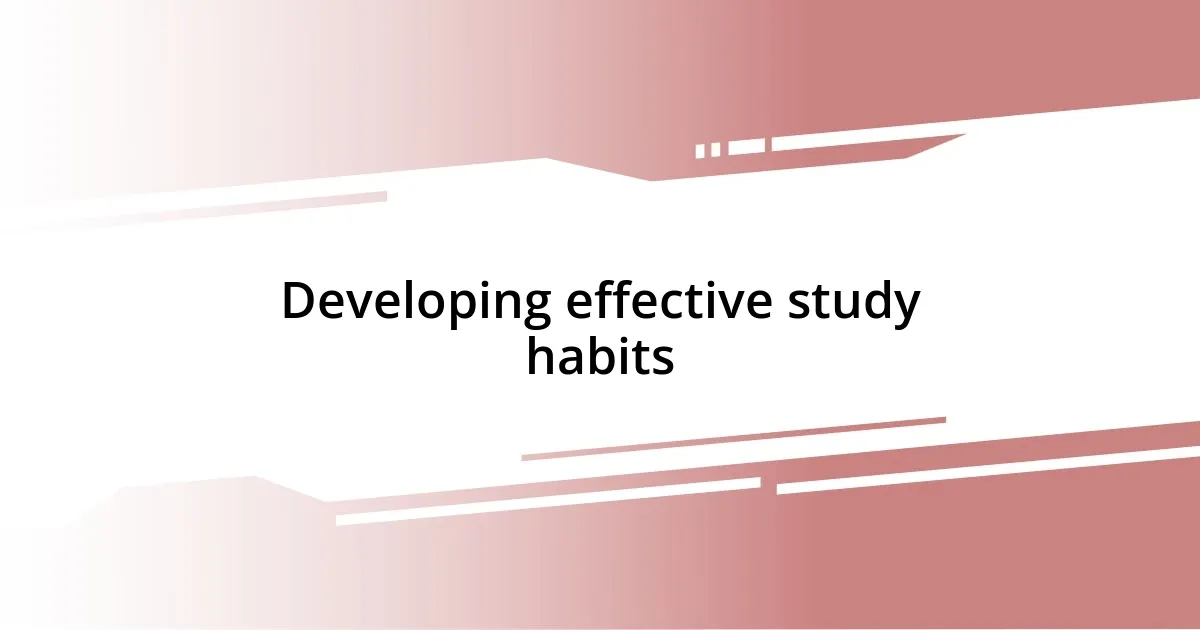
Developing effective study habits
Developing effective study habits can truly transform the language learning experience. One approach that worked for me was creating a structured daily study plan. Initially, I dabbled with random study sessions whenever I felt inspired, but I quickly discovered that consistency was key. Setting aside specific times daily, even if just 20 minutes, helped me build momentum and make learning a part of my routine.
A few specific strategies that I found helpful include:
- Setting clear goals: I began by defining what I wanted to accomplish, whether it was mastering certain vocabulary or practicing grammar points.
- Using spaced repetition: This technique helped me remember vocabulary better. I’d revisit words at spaced intervals, which ultimately improved my retention.
- Mixing up study materials: I incorporated language apps, podcasts, and books to keep things fresh and engaging, making me less likely to lose interest.
- Setting milestones: Celebrating small victories, like successfully having a short conversation, encouraged me to continue pushing forward.
Additionally, I learned the importance of reflection in my study habits. Each week, I took time to assess what strategies worked and what didn’t. I remember feeling discouraged when a particular method failed, but that flicker of frustration pushed me to adapt rather than give up. Finding a study partner also made a noticeable difference; practicing with someone else not only built my confidence but also kept me accountable. I could feel the synergy during our conversations, almost as if we were co-pilots on a language-learning journey, navigating challenges together. In those moments, I truly understood the phrase “learning together is growing together.”
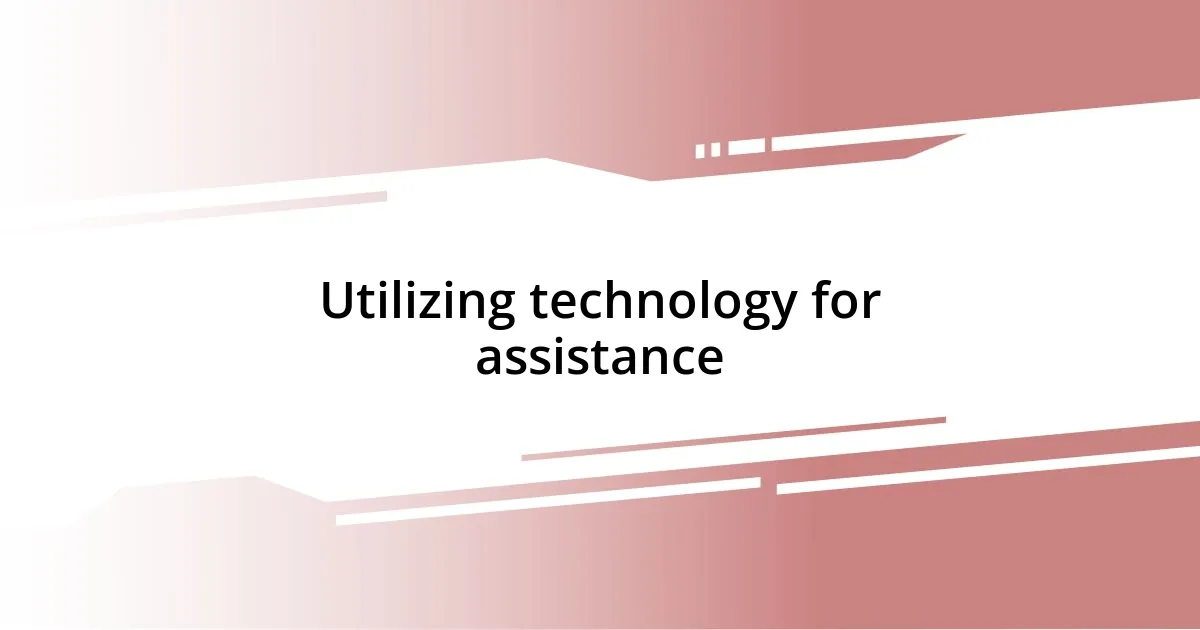
Utilizing technology for assistance
Utilizing technology played a pivotal role in my language learning journey. I vividly recall stumbling upon a language exchange app that connected me with native speakers around the world. Initially, I was hesitant to reach out, but the prospect of real conversations motivated me. Engaging in chat and voice calls not only improved my speaking skills but also provided invaluable context and cultural insights. Have you ever considered how technology can bridge the gap between learners and native speakers? It transformed my experience in remarkable ways.
Another tool I discovered was online resources for immersive listening practice. One of my favorites was a podcast series tailored for language learners. The episodes were designed to gradually increase in complexity while keeping the topics relatable and engaging. I remember listening to an episode about everyday life in a foreign city and surprisingly, I found myself understanding much more than I thought I would. It opened my ears to different accents and slang, which significantly boosted my listening comprehension. How often do you find opportunities like this to expose yourself to real-world language?
Moreover, my smart assistant became an unexpected ally. I started to integrate voice commands in my target language during my daily routine, whether it was setting reminders or asking for weather updates. The more I practiced speaking casually with my smart assistant, the more comfortable I became articulating my thoughts. It’s incredible how a simple tool could diminish my fear of speaking, making it feel more like a conversation with a friend. Have you explored how everyday technology can support your language goals? It’s not just about structured lessons; it’s about weaving the language into your life.
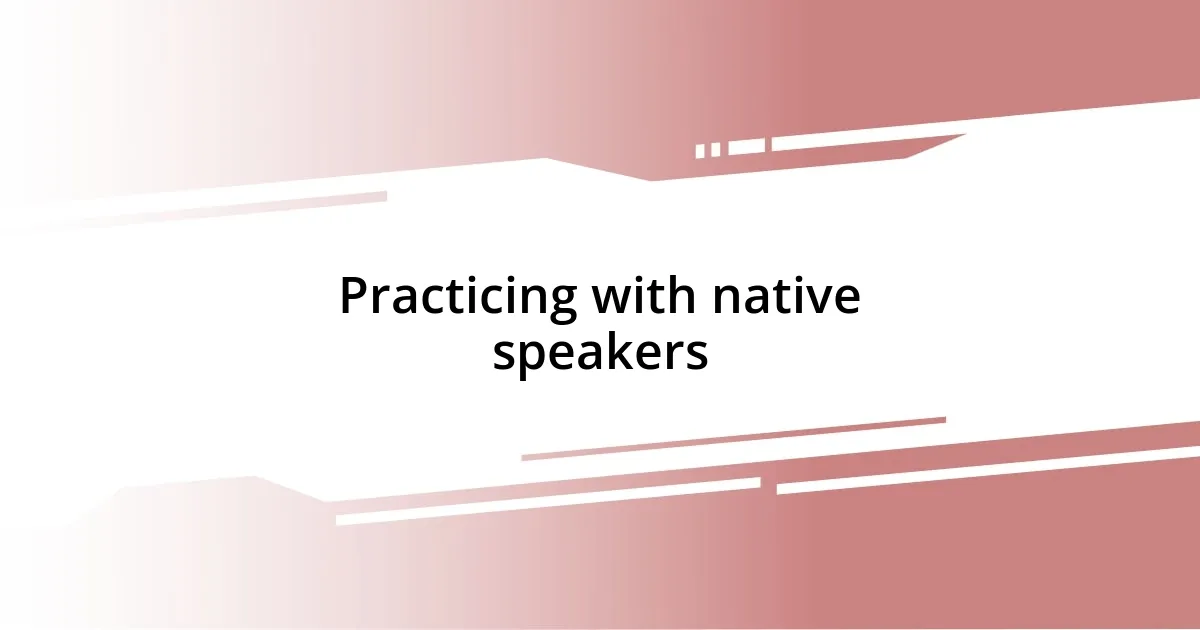
Practicing with native speakers
Practicing with native speakers opened up a whole new world for me. I remember my first language exchange meeting; I was a bundle of nerves, fidgeting with my notes, fearing that I’d stumble over my words. But once we started chatting, I realized that the connection we built went beyond language—it was about sharing stories, cultures, and laughter. Have you ever felt that magic when two worlds collide over a shared interest? That’s what it felt like.
Engaging with native speakers taught me more than just vocabulary; it immersed me in the rhythm and flow of the language. One particular conversation stands out in my memory—discussing local cuisine with a friend from Spain. As we chatted about different dishes, I not only learned new words but also acquired an authentic sense of how they express excitement and nostalgia around food. It’s these cultural nuances that textbooks often miss. When was the last time you had a conversation that deepened your understanding of a language and its culture?
Over time, I found that practicing with native speakers boosted my confidence tremendously. The more I conversed, the less I feared making mistakes. I recall a moment when I mispronounced a word and instead of embarrassment, we both burst into laughter. That shared moment of humor was a revelation—I learned that mistakes are just stepping stones on the journey. It made me realize that real communication is about connection, not perfection. Have you ever experienced a moment where laughing at a mistake taught you more than the lesson itself?
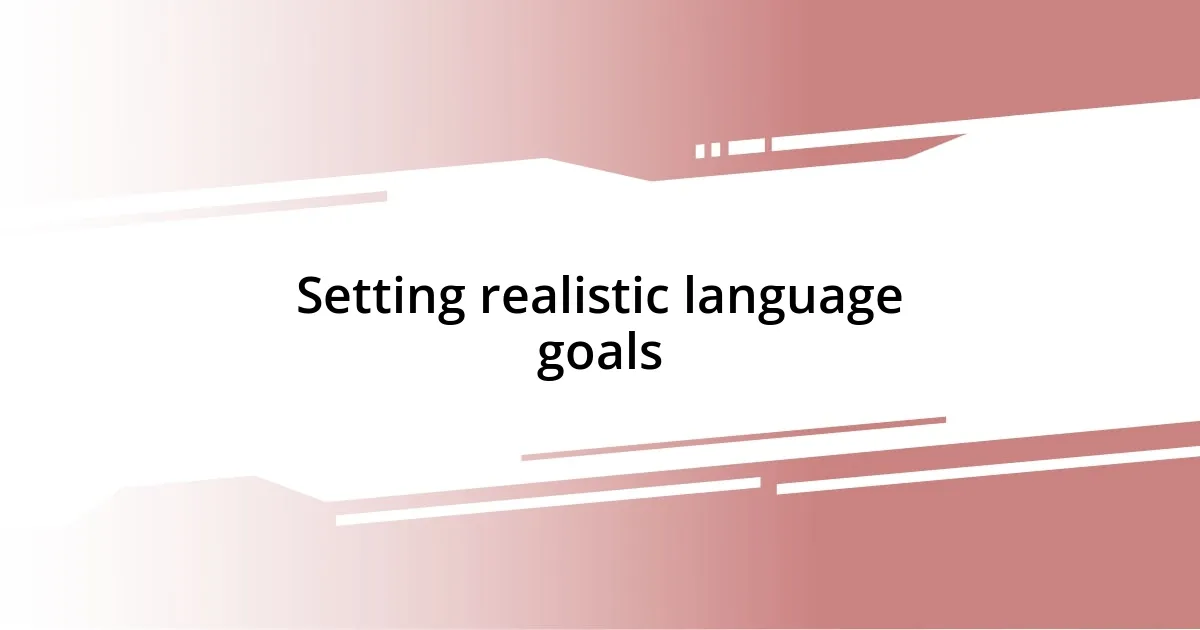
Setting realistic language goals
Setting realistic language goals has been crucial in my journey. Early on, I recognized that I couldn’t learn everything at once. I started by aiming to learn just five new words a day. It felt manageable, and soon, I found myself integrating those words into simple sentences. Have you ever broken down a big challenge into bite-sized pieces? It’s a strategy that definitely worked for me.
As I progressed, I adjusted my goals based on my experiences. I recall setting aside time each week to have brief conversations with friends who spoke the language. Initially, these conversations were short and filled with pauses, but they became opportunities for growth. The sense of accomplishment I felt after each chat was incredible. How often do we celebrate small victories? For me, celebrating those moments kept me motivated.
I’ve learned that the path to fluency isn’t a straight line; it’s more like a winding road. Setting realistic timelines helped me stay patient and avoid burnout. When I aimed for small, measurable goals instead of fluency in three months, I discovered a newfound sense of enjoyment in learning. It’s a reminder that every word and conversation chips away at the mountains we hope to climb. What goals have you set that keep your passion alive?
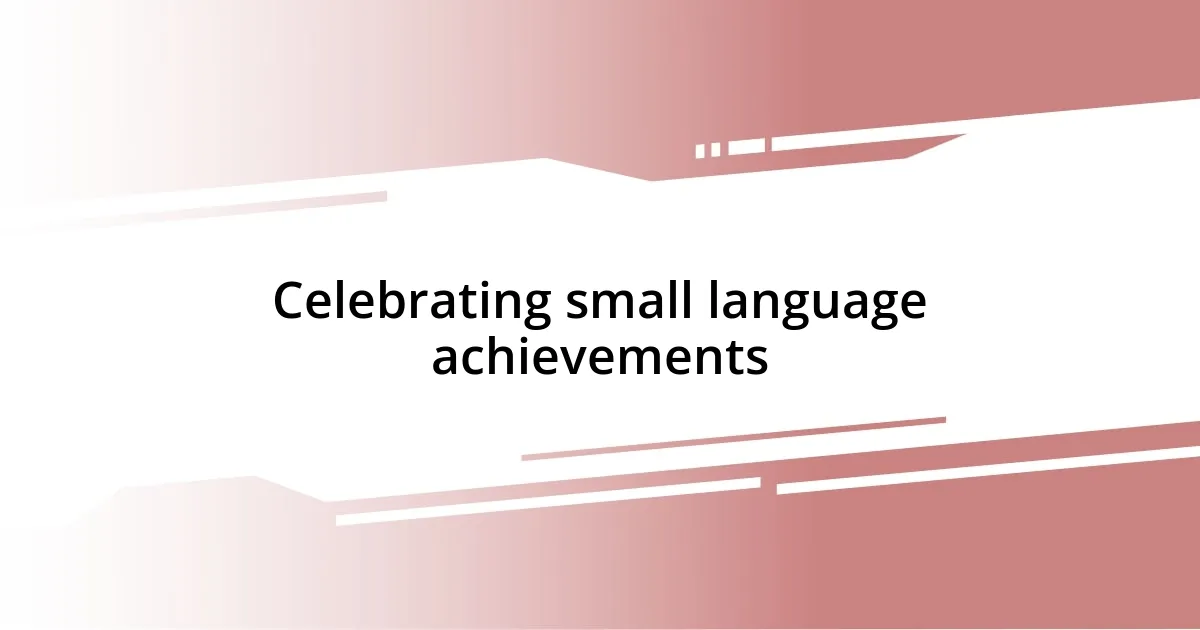
Celebrating small language achievements
Celebrating small language achievements has been a game changer for me. I remember the thrill I felt when I could finally introduce myself without hesitating. That moment might seem trivial, but for me, it was a victory worth savoring. Have you ever considered how small milestones can sprinkle motivation throughout your journey?
One time, I managed to order my favorite dish at a restaurant entirely in the target language. The waiter responded with a genuine smile, and for a moment, I felt like I belonged in that world. That small success ignited a spark in me; it was not just about words but about connection. Can you think of a time when using a new language made you feel truly proud?
Reflecting on these moments helps shift my perspective on learning. Instead of getting bogged down by how much I still needed to learn, I began to jot down my achievements in a journal. Each entry became a source of inspiration, a reminder that progress, no matter how small, is still progress. How do you keep track of your milestones, and do you find that celebrating them can transform your outlook?










